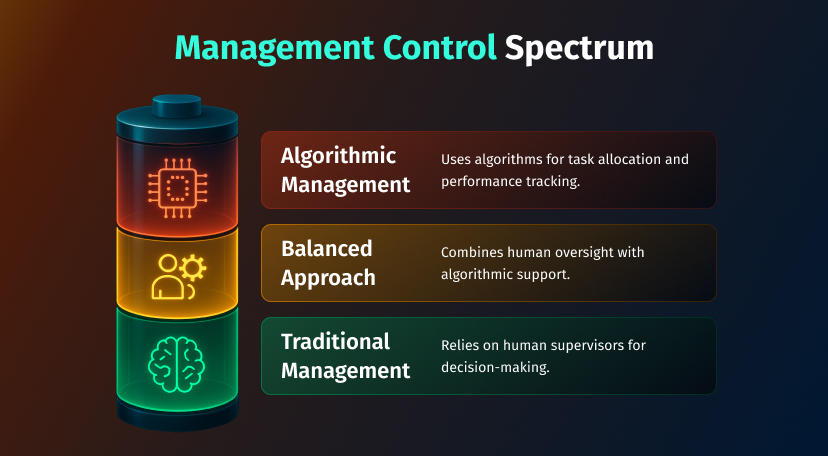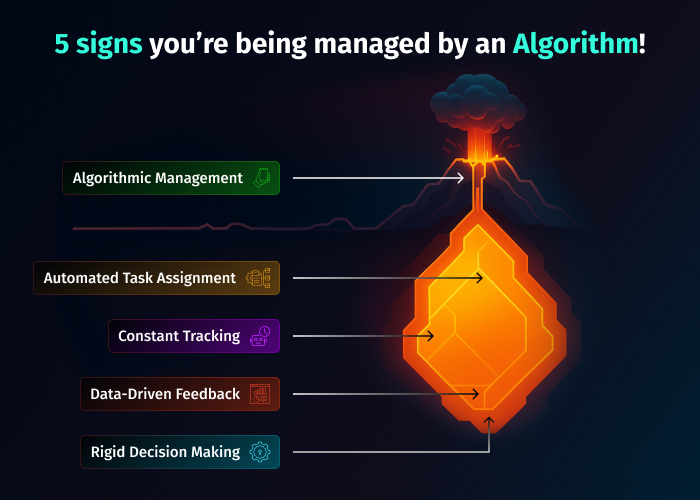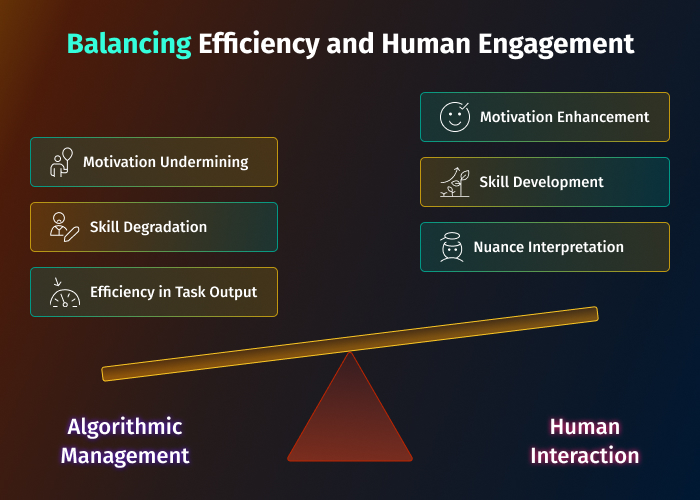Algorithmic management is becoming ubiquitous in modern workplaces, yet many employees aren’t even sure what it really means. If you’ve ever had an inkling that a machine might be pulling the strings at your job, this article will help you uncover the truth and explore whether there’s a more humane approach to managing the workforce.
What is Algorithmic Management?

Algorithmic management involves using computer programs, particularly algorithms, to make decisions or manage various responsibilities traditionally handled by human supervisors. Picture this: it’s Monday morning, you’re ready to tackle the day, but it seems like your schedule, tasks, and even performance evaluations are pre-determined by complex codes. No surprises there – highlighting the growing trend towards this high-tech management style. From dispatching tasks to tracking productivity, algorithms are streamlining some areas of work life. However, the absence of human judgement often leads to a few blunders.
5 signs you’re being managed by an Algorithm!

- Task Assignment Feels Like a Machine-Made Decision:
Are your tasks showing up based on system generated logic – like project urgency, past performance, or system calculated Key Performance Indicators (KPIs) – without room for discussion or personal input? While prioritizing tasks by urgency is reasonable, when every assignment feels automated and inflexible, you’re likely experiencing algorithmic allocation. - You’re always being tracked – But who’s it really for?
From time trackers to activity dashboards, your every move is logged. Your work isn’t just observed – it’s quantified. If this data is being used to monitor task progress, improve workflows, or maintain project history, that’s reasonable. But if the intent shifts toward constantly evaluating you – your pace, break, or behavior – without context or consent, it crosses into surveillance. The difference lies in whether the system is tracking the work or tracking you. - Metrics Speak Louder Than Managers
If your performance feedback comes primarily through dashboards, automated reports, or system generated summaries – “tasks completed”, “tasks logged” – you might be operating under algorithmic management. While data-driven insights can totally help guide progress related to work, when they replace meaningful dialogue, context gets lost. Performance isn’t just about numbers – it’s about the why behind them, and the conversations that help people grow. - Decisions lack Context or Flexibility
Ever heard: “We can’t make an exception – it’s how the system works”? That’s the hallmark of rigid, rule-based management designed for optimization, not empathy. - Human Interaction is Optional
If you rarely need to speak to a real manager and instead rely on systems, dashboards, and bots – your workplace might already be deeply algorithmic.
A Shift from Algorithmic to Human Interaction and Why It Is Needed!

- Context is Lost
Algorithms are great at pattern recognition, but poor at interpreting nuance. A developer mentoring juniors or handling hidden technical debt won’t score high on a system focused only on task output. - Human Skills Degrade
When AI handles decisions, humans stop developing judgement. Over time, professionals lose their ability to navigate complexity independently, relying on systems rather than intuition. - It Undermines Motivation
People thrive on autonomy, trust, and recognition. When decisions are opaque and rigid, motivation erodes. Employees feel like crocs in a machine – efficient but disengaged.
A Better Way: Human Centered Algorithmic Management
Instead of rejecting AI, we need to rethink how it can be correctly implemented in corporate management:
- Use AI as a coordinator, not a controller – Let it assist humans, not replace them.
- Encourage collaborative AI implementation – Involve teams in deciding how algorithms guide workflows.
- Support context aware feedback – Mix human judgement with AI-driven insights for richer reviews
- Prioritize employee autonomy – Allow self selection of tasks or schedules with AI assisting, not dictating.
Conclusion
Statistically-improved performance metrics can be poorly interpreted if automation lacks the human touch. This is where human-centered algorithmic management takes the stage. Imagine a balance, where algorithms handle monotonous tasks but leave room for humans to manage pivotal decisions and interactions. In this hybrid model, machines handle data processing while humans oversee decision-making and employee welfare. Together, they create an adaptable, empathetic work environment that values individuality as much as performance metrics. Time to decode your workplace! Is your management forward-thinking or stuck in a loop of data dependency?”
Ravi Bhojani is the Chief Marketing Officer (CMO) at Alian Software, where he spearheads the company’s marketing strategies and drives its brand presence in the competitive IT services landscape. With over a decade of experience in the technology and marketing sectors, Ravi has consistently demonstrated his ability to blend innovative marketing techniques with deep industry knowledge to deliver outstanding results.